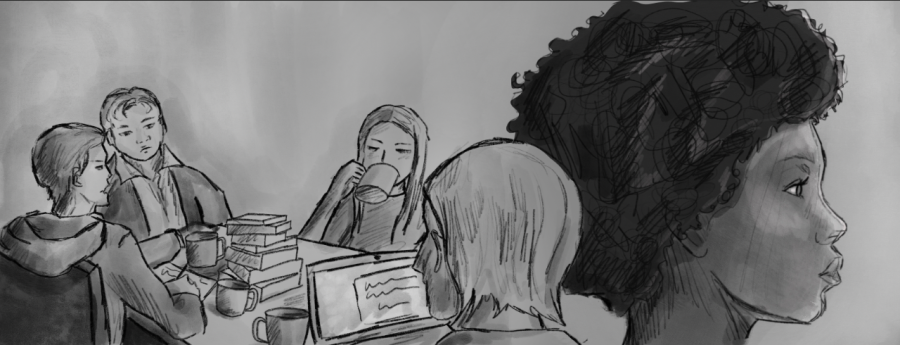Dear English department
The English department discusses the curriculum with Pecola from The Bluest Eye in the background.
December 1, 2022
English class is a chance to explore unknown worlds and step into the minds of characters with different experiences and backgrounds. Whether these stories are hilarious, uplifting or heartbreaking, they deserve to be thoughtfully contemplated. Though much of this content includes mature themes, the English department has consistently failed to adequately address one of them: sexual assault.
The department has rarely been able to properly approach sexual assault in literature, glossing over it in classes and discussions. In an assignment for English III: The American Living Odyssey, students had to write a fictional letter to a jury in defense of a child rapist. While I am not a student in this class, I have obtained a copy of the assignment and have talked with students who are enrolled.
In Toni Morrison’s book “The Bluest Eye,” Cholly Breedlove, a middle-aged Black man who dealt with physical assault, sexual assault and racism since childhood, rapes and impregnates his 11-year-old daughter, Pecola.
Students are forced to take the position of Cholly’s childhood friend, who fears that Cholly will face the death penalty. To complete the assignment, they had to explain to an imaginary jury why Cholly decided to rape Pecola, attempting to make the rape understandable and provide alternatives to his punishment.
The project forced students to defend Cholly’s actions, downplaying their impacts on Pecola. An introduction to the assignment describes Cholly as “a man who is subject to a host of pressures that are at times contradictory to and hurtful.” While it is crucial for students to discuss the complex circumstances Cholly faced to better understand his character and the book, the assignment was framed in a way that defends his actions rather than clearly confronting how morally reprehensible they are. Interviewed students felt as if they were forced to find ways that Cholly’s actions were understandable, and a lack of discussion prior to the assignment left them confused about how his traumatic background led him to rape Pecolla.
While the English department had zero intentions of justifying Cholly’s actions as stated in the assignment, the setup of students writing a letter to reduce his punishment is an inherent justification. Additionally, sidestepping Cholly’s sexual violence by focusing entirely on his internal conflicts—forcing students to come up with ways to excuse the inexcusable—is not a responsible approach to the topic. English is about leaning into discomfort to understand humanity, but this assignment was a mandatory defense of actions that often go unpunished and unrecognized in the real world. The classroom needs to be a place to grapple with sexual violence in an honest and sensitive way. While it’s important to acknowledge his internal conflicts and how Morrison tries to find the origins of his crime, fully condemning his decisions should be common sense.
The English department’s failure to sensitively approach sexual violence extends beyond one assignment. In the novel “Salvage the Bones,” Esch Batiste, a 15-year-old black girl, is a victim of statutory rape.
Esch grew up as the only woman in her neighborhood, leading her to conflate sex with empowerment, even as a 12-year-old. When 19-year-old neighbor Manny rapes her, she is left physically and emotionally defenseless.
“Salvage the Bones” represents real issues for young black women in a male-dominated society, and it is essential to have conversations about them. But while acknowledging the characters’ age gap, teachers placed minimal focus on how Esch was not capable of understanding her relationship with Manny. Instead, classes only analyzed the scene from her flawed views of empowerment, ignoring the manipulation and grooming that impacted her mindset. Teachers need to be more cautious when presenting these issues to high school students instead of bounding discussions within the world of a pre-teen’s psyche.
An outline of the English Department’s plans for discussions and assignments that deal with sexual assault is absolutely necessary. The English Department has previously put together a document with trigger warnings and created in depth discussions and assignments, but there needs to be more consistency across classes. Explorations of community, as well as circumstances of the victim and rapist, are a crucial part of teaching students to firmly condemn assault and understand how current cultural mindsets reinforce its presence in our world.
At the very least, students should have greater freedom in assignments regarding these topics. Instead of being forced to take a position that humanizes rapists, they should be allowed to align with the victims and propose punishment for the rapists.
The department doesn’t need to ignore or shy away from a central issue in these novels. In fact, it should do the opposite—sexual violence needs to be thoroughly addressed in class. Leaving out these discussions generates ambiguity and ignores the physical and psychological harm this violence leaves behind.
This article was updated on 12/13/22 to contain a more accurate depiction of the assignment and the inclusion of a trigger warning document from the English Department. At the same time, the writer clarified her opinion and incorporated interviews from students in the class.






























Bryce • Feb 27, 2023 at 7:13 am
Wow, this story is amazing! I love how you went in on it and gave a summary of the story it was perfect! I noticed how you also speak about how his actions were wrong towards his daughter and how teenagers are being forced to see his actions as not wrong doing because of what he has experienced as a child which is still not the point. He still did something wrong and a bad outcome came out of it, this story is great love it keep doing what you’re doing!!